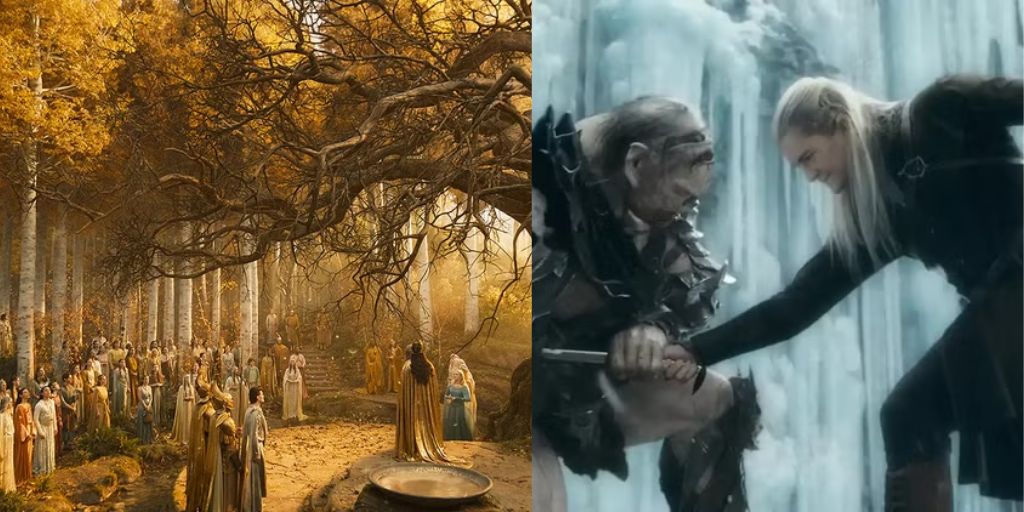The Elves, also known as Quendi, are fascinating and mysterious beings in J.R.R. Tolkien’s stories. They play key roles in The Lord of the Rings, The Hobbit, and the TV show The Rings of Power. Compared to Men and Dwarves, the Elves stand out because they are almost immortal.
Among them are Sindarin Elf Legolas and Calaquendi High Elf Galadriel. Both belong to the same family, but their ancestral histories divide into different branches.
The Creation of Elves and Men
The book The Silmarillion tells us more about how Eru Ilúvatar, the supreme being of the Universe, created the Elves and Men, who are called the “Children of Ilúvatar.” The Avari are a group of Elves who chose not to follow the call of the Valar to Valinor, a land of peace and eternal light. Their decision to stay in Middle-earth makes them different from the Eldar, who accepted the Valar’s invitation and journeyed to Valinor.
The story of the Avari begins with the awakening of the Elves, the Firstborn of Ilúvatar. They awoke by the shores of Cuiviénen, a remote and mythical place in Middle-earth.
The Elves were the first beings to awaken in the world. The Valar, powerful beings responsible for shaping and governing the world, learned about the Elves and wanted to protect them from Melkor, the first Dark Lord, later known as Morgoth.
The Valar believed the Elves were special creatures and invited them to Valinor to keep them safe from Morgoth’s evil. In the section “Of the Coming of the Elves and the Captivity of Melkor” from The Silmarillion, Tolkien highlights that this invitation was a key moment in Elven’s history. It caused a division, both physically and culturally, between those who accepted the call (the Eldar) and those who refused (the Avari).
The Avari, whose name means “The Unwilling” in Quenya (the Elvish language), decided to stay in Middle-earth. They made this choice for several reasons: some were afraid of the long journey, others were content with their lives, and some did not trust the Valar.
The Choice of the Avari
Because Tolkien wrote little about the Avari, they remain mysterious. What is known is that they stayed scattered across Middle-earth and, over time, changed in language, culture, and appearance from their kin in the West. Since they chose to stay, the Avari did not gain the same knowledge and wisdom that the Eldar gained from their interactions with the Valar. As a result, their kin viewed them as more rustic or uncivilized.

One of the most interesting aspects of the Avari is their relationship with other peoples of Middle-earth, especially with Men. In Tolkien’s works, it is suggested that the early Men who awoke in the eastern parts of Middle-earth first met the Avari.
These early encounters helped Men form their first impressions of the Elves. However, as time passed, the Avari became more secretive and hidden. They faded into obscurity as the more powerful Elven kingdoms of the Eldar and Sindar became more dominant.
The Avari’s Life in Middle-earth
The Avari’s life in Middle-earth was marked by both beauty and struggle. Unlike the Eldar, who enjoyed the light and safety of Valinor, the Avari faced the dangers of a world plagued by darkness and evil. They lived in various places across Middle-earth, including forests, mountains, and valleys. Their homes were often hidden and hard to find, which added to their mystery.
The Avari were known for their unique cultures and traditions. They developed their own languages and customs, separate from those of the Eldar. These differences made them interesting but also created misunderstandings with other Elves. The Avari held onto their way of life, focusing on living in harmony with nature.
The Avari had a strong connection to the land. They respected the natural world and saw themselves as part of it. This relationship with nature influenced their art, music, and stories. They created beautiful songs about their surroundings, celebrating the beauty of Middle-earth. However, their isolation also meant that they could not easily share their culture with others.
The Threat of Darkness
Though they were often overlooked in Tolkien’s narratives, the Avari played an important role in the larger story. Their choice to stay in Middle-earth came with tragic consequences. As they remained behind, the land began to change. Darkness and corruption grew stronger due to Morgoth’s influence.
Morgoth’s rise to power brought suffering to all free peoples, including the Avari. While the Eldar found safety in Valinor, the Avari faced the full impact of Morgoth’s evil. They witnessed the devastation he caused and the chaos that followed.
One idea in Tolkien’s lore is that Orcs were originally Elves who were corrupted by Morgoth. Because the Avari remained in dangerous areas of Arda, far from the protection of the Valar, they were vulnerable to Morgoth’s attacks. He captured many of them, subjecting them to torture and dark magic. This dark sorcery twisted their bodies and minds, transforming them into creatures that served Morgoth.
In The Two Towers, Treebeard tells Merry and Pippin about Trolls, saying, “…Trolls are only counterfeits, made by the Enemy in the Great Darkness, in mockery of Ents, as Orcs were of Elves.” This connection between the Avari and the Orcs highlights the tragic fate of those who remained behind.
The Evolution of the Avari’s Story
Throughout his career, Tolkien revisited the origins of Orcs multiple times. One major concern he had was how High Elves could become such twisted forms as Orcs. In later writings, he considered the idea that Orcs might have been created from Men instead of Elves, as Men were more easily corrupted. This ongoing scheme of the Avari and Orcs adds depth to the story of Middle-earth.
The Avari’s story is complex, filled with themes of choice, consequence, and resilience. While they may not be central to The Lord of the Rings, they contribute to the richness of Tolkien’s mythology. Their experiences show the impact of decisions and the challenges of living in a world filled with darkness.
The Legacy of the Avari
The Avari’s legacy continues to resonate through Tolkien’s works. Their choice to stay in Middle-earth serves as a reminder of the strength found in remaining true to oneself, even in difficult circumstances. The Avari embodies the spirit of independence and the importance of choices in shaping one’s destiny.
Despite their tragic fate, the Avari represent hope and endurance. They survived in a world filled with threats and maintained their identity even as darkness surrounded them. This resilience adds depth to the full mythology and highlights the varied experiences of the Elves.
A Different Perspective on Elves
The Avari also provides a different perspective on what it means to be an Elf. While the Eldar experienced enlightenment and growth in Valinor, the Avari lived in a more primitive state, facing the raw realities of Middle-earth. This contrast allows readers to see the complexity of the Elvish experience, showcasing different paths and outcomes.
The interactions between the Avari and other peoples of Middle-earth, especially Men, illustrate how choices and relationships shape identities. The Avari’s early encounters with Men influenced their understanding of the Elves and contributed to the myths and stories that emerged in later generations.
The Role of Nature
The Avari’s close relationship with nature stands out in Tolkien’s stories. Their deep respect for the land and its creatures highlights the importance of harmony with the natural world. The Avari saw themselves as part of the cycle of life and believed in living sustainably. This connection to nature influenced their way of life, art, and traditions.
As custodians of the land, the Avari understood the value of preserving the environment. Their songs and stories reflected their appreciation for the beauty of Middle-earth, celebrating the forests, rivers, and mountains that surrounded them. This deep bond with nature serves as a powerful reminder of the importance of caring for the Earth.
The Mystery of the Avari
The mystery surrounding the Avari adds intrigue to Tolkien’s legendarium. Because little is known about them, readers are left to ponder their lives and experiences. This ambiguity encourages imagination and invites fans to create their own stories about Avari.
Tolkien intentionally left many details about the Avari open to interpretation. This choice allows readers to engage with the material and show the themes of choice, consequence, and the complexities of existence. The Avari embodies the idea that not all stories are fully told and that some mysteries remain.
Conclusion: The Avari’s Place in Tolkien’s World
In the grand scheme of Tolkien’s world, the Avari hold a unique and essential place. Their story illustrates the richness and complexity of Elven’s life, emphasizing the themes of choice, consequence, and resilience.

While they may not be as celebrated as the Eldar, the Avari contribute to the depth of Middle-earth, reminding us of the strength found in embracing one’s identity and the lasting impact of choices.
The Avari serves as a testament to the diverse experiences of the Elves and the importance of their role in the wider mythology.
Their connection to nature, relationship with other beings, and tragic fate enrich Tolkien’s storytelling. The Avari reminds us that every choice shapes our path and that even in darkness, there can be beauty and strength.




